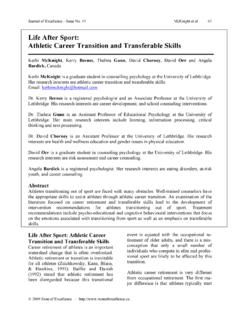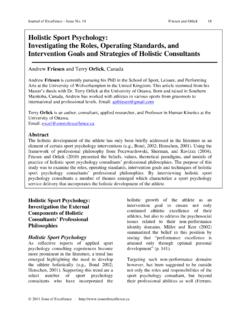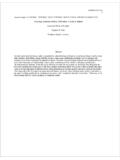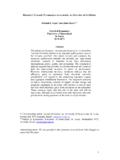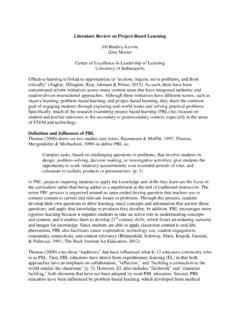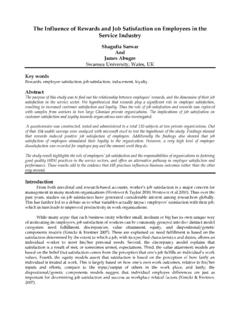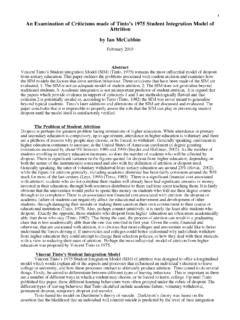Transcription of The Impact of a Positive Living Skills Training …
1 Journal of Excellence Issue No. 11 Hester & Orlick 4 2006 Zone of Excellence - The Impact of a Positive Living Skills Training Program on Children with Attention-Deficit Hyperactivity Disorder Kealey Hester and Terry Orlick, Canada Kealey Hester, Canada Kealey Hester has been working in the fields of recreation and education for young children for over a decade. She recently completed her Masters Degree under the supervision of Terry Orlick at the University of Ottawa and is currently an Intensive Behavioral Therapist for preschool-aged children diagnosed with autism in the Toronto area. Kealey hopes to pursue further studies in the areas of behavioral intervention and select populations in the future. Email: Terry Orlick is an author, consultant, applied researcher and Professor at the University of Ottawa.
2 Email: Abstract Medication and psychotherapy have been used traditionally to treat the symptoms of Attention-Deficit Hyperactivity Disorder (ADHD). The purpose of this research was to evaluate the use of a mental Skills Training program, Orlick s (1998) Positive - Living Skills (PLS) program, on three male children ages 8 to 9-years-old with ADHD. The PLS program teaches children mental Skills including relaxation, focus and distraction control. A multiple case study method was administered to determine (a) whether the participants enjoyed the PLS programs; (b) the extent to which the Skills were implemented by the children on a daily basis; and (c) the effectiveness of the Skills in facilitating self-control and focus management by the participants.
3 The results of this study were extremely Positive . The participants learned to relax, focus and control distractions. The PLS program empowered these three children to assume responsibility for their actions, to manage ADHD behaviors, and provided Positive alternatives to negative behavior. Introduction Extensive research has been compiled sur-rounding the use of stimulant medications in managing the behaviors of children diag-nosed with Attention-Deficit Hyperactivity Disorder (ADHD), however only a small number of have endeavoured to examine the use of self-modulated programs in managing this disorder. Initially recognized in the Di-agnostic and Statistical Manual for Mental Disorders in 1980 (American Psychiatric Association, DSM-III, 1980) ADHD is a behavioral disorder recognized by two core characteristics, inattention and impulsiv-ity/hyperactivity.
4 The symptoms of ADHD can manifest at varying degrees and are identified by behaviours that impede aca-demic performance, social interactions, and the completion of developmental tasks (Krueger & Kendall, 2001). Children diag-nosed with ADHD often exhibit aggression, Journal of Excellence Issue No. 11 Hester & Orlick 5 2006 Zone of Excellence - frustration, lack of internal control, dimin-ished intrinsic motivation, and limited reac-tion to external motivators. Subsequently, depression and low self-esteem become sec-ondary symptoms (Leipold & Bundy, 2000). Children diagnosed with ADHD are also subject to poor peer relations due to aggres-sive conduct, and are often rejected due to their overzealous and insensitive behaviours (Blachman & Hinshaw, 2002).
5 The inability to maintain attention and the exhibition of impulsive behaviours also limit the learning abilities of the child, which become in-creasingly detrimental to academic achievement and results in lower scores (Kerns, McInerney & Wilde, 2001; Kruger & Kendall, 2001). An ADHD diagnosis also impacts on the family situation, sometimes causing disruption and hostility in parent and sibling relationships with the diagnosed child (Lobar & Phillips, 1995). Discipline concerns and low family cohesiveness con-tribute to an increased potential for a con-flict-ridden situation, often resulting in in-creased frequency of maternal depression, marital conflict, and elevated intensity of maternal discipline (Bor, Sanders, & Markie-Dadds, 2002; Lavigne, Arend, Rosenbaum, Binns, Christoffel, & Gibbons, 1998; [NIH], 2000).
6 ADHD often persists into adulthood, with most children experi-encing a decrease in symptoms during mid- to late adolescence (Hupp & Reitman, 1999; Wood, 1999). The effects of an ADHD-di-agnosis that persist into adolescence and adulthood are likely to result in low em-ployment and socio-economic status, antiso-cial behaviours and mood problems (Waschbusch, Pelham, Jennings, Greiner, Tarter, & Moss, 2002; Wood, 1999). ADHD is diagnosed by assessing a series of pre-established characterizing factors ad-ministered by a physician and/or child psy-chiatrist (Pillow, Pelham, Hoza, Molina and Stulz, 1998). The diagnostic criteria requires that the child experience six or more speci-fied symptoms of inattention and/or hyper-activity-impulsivity for at least six months to an extent that is maladaptive and inconsis-tent with the characteristic developmental level (American Psychiatric Association, 1994).
7 Traditional treatment methods targeted the medical community and medical practitio-ners as the most appropriate to manage ADHD. Few attempts have been made to teach children mental Skills that may help them manage their own ADHD behaviors, perhaps because they are considered too young to be able to administer any form of treatment. Despite the controversial diagno-sis and treatment protocols, ADHD remains the most commonly diagnosed behavioral disorder in children (National Institute of Health [NIH], 2000), with a boy-to-girl pro-portion of 3:1 (Wood, 1999). Currently, between 5 and 10% of school-aged children in North America have been diagnosed with ADHD (Hoagwood, Kelleher, Feil, & Comer, 2000; Johnston, 1996; Waschbusch, et al.)
8 , 2002) stimulating research to effec-tively manage the behaviors. These numbers alone provide support for the need to con-duct research on appropriately designed programs to teach children Skills to effec-tively manage their own behaviors. While research on relevant self-control pro-grams for children with ADHD is clearly warranted, no reports have utilized a mental Skills program in an attempt to teach chil-dren with ADHD important Skills like re-laxation, focusing and distraction control. The purpose of this study was to introduce and evaluate the effectiveness of select Skills from Orlick s Positive - Living Skills (PLS) program (1998), a mental Skills program for children, to determine; (a) whether the par-ticipants with ADHD enjoyed the PLS pro-grams; (b) the extent to which the Skills Journal of Excellence Issue No.
9 11 Hester & Orlick 6 2006 Zone of Excellence - were implemented by children diagnosed with ADHD on a daily basis; and (c) the ef-fectiveness of the Skills in facilitating self-control behavior management by the partici-pants with ADHD. Review of Literature Medication Therapy Research estimates that 3 to 5% of school-aged children are currently undergoing psy-cho-stimulant medication therapy to control and manage behaviour symptoms associated with ADHD (Blachman & Hinshaw, 2002; Hoagwood et al., 2000; Janetti, 2000; Johnston & Leung, 2001). Methylphenidate, also recognized as Ritalin , Concerta , and Metadate , is the most commonly pre-scribed psycho-stimulant medication for ADHD.
10 Over seventy percent of ADHD-di-agnosed children are using this medication, with a significant increase over the last two decades (Klein-Schwartz, 2002). Less com-monly used psycho-stimulant treatments for ADHD include dextroamphetamine and pemoline (NIH, 2000). Race, sex, age, socio-economic status and family relations do not appear to Impact the effectiveness of methylphenidate, although low intelligence may be associated with an inferior response to treatment (Wood, 1999). Methylphenidate serves the child by blocking dopamine transporters and increasing attention signal-ing, resulting in a decrease in activity while increasing concentration (Vastag, 2001).
